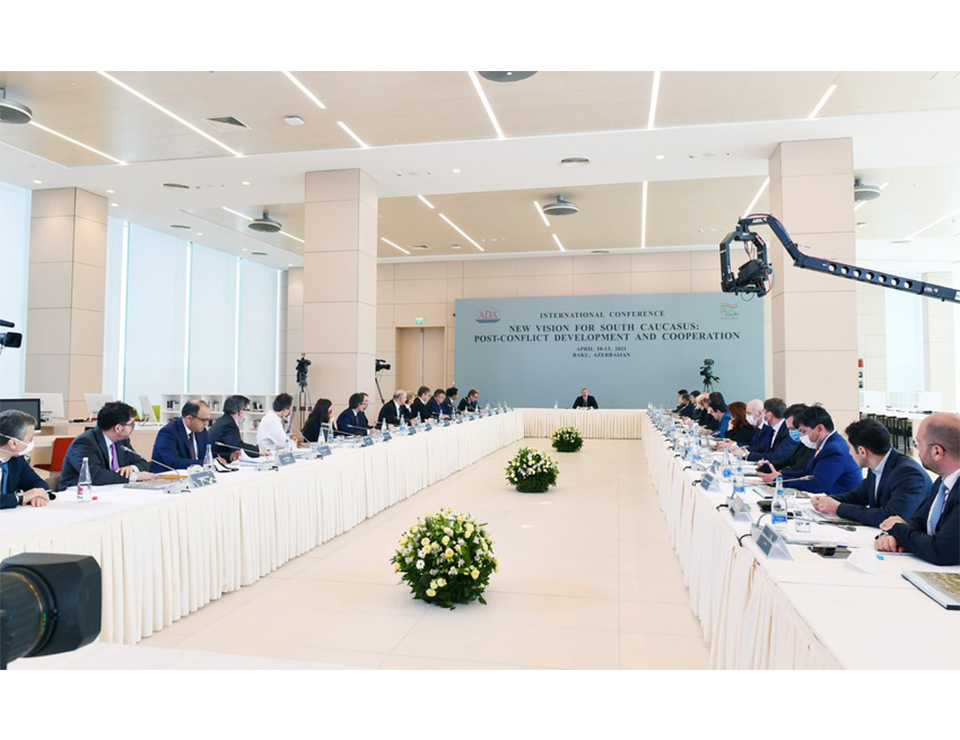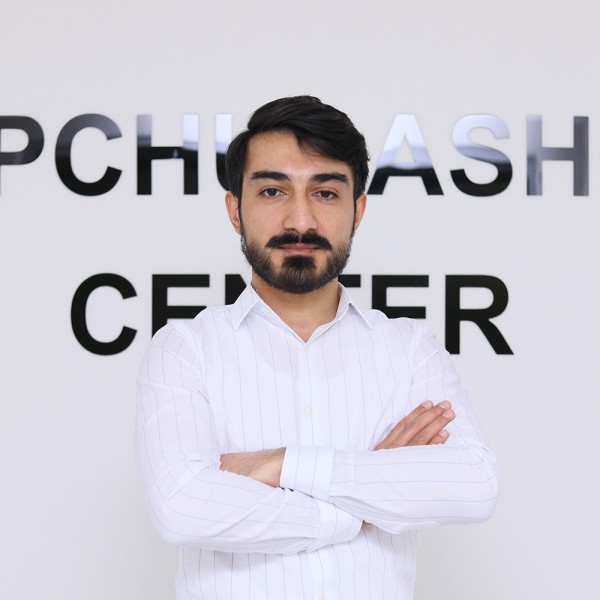President Aliyev's 13 April conference: talking points

On April 13, Azerbaijani President Ilham Aliyev attended an international conference entitled “New Vision for South Caucasus: Post-Conflict Development and Cooperation”, held at ADA University in Baku. Conference participants included renowned scholars specialized in regional affairs and representatives of leading think tanks. Answering questions from the participants, President Aliyev touched upon crucial points on different aspects of Azerbaijani foreign policy in the post-Karabakh War period and Baku’s approach to recent geopolitical developments in the wider Caspian region.
Commenting on the possibility of reconciliation between Armenians and Azerbaijanis after the war, the President said that Azerbaijan is ready to discuss future scenarios in this regard but he cannot see an appropriate reaction from the Armenian side. Accordingly, the reconciliation process may prove to be quite long mainly due to the long period of demonization of Azerbaijan among the Armenian society. At the same time, he presented Azerbaijan’s permission to deliver humanitarian assistance to Karabakh Armenians and Russian gas exports to Armenia through Azerbaijan’s territory as a goodwill gesture to promote peace in the region.
To the question of what kind of strategy Armenia and Azerbaijan should pursue to achieve long-standing peace and the possibility of opening Turkey-Armenia borders, President noted that Nagorno-Karabakh conflict is over but he does not know Armenian intentions in this regard as Armenian leaders are either silent about the issue or use aggressive rhetoric (Armenia’s Foreign Minister) towards Azerbaijan and Turkey. Azerbaijan considers the Armenian people residing in the remaining parts of Karabakh as its own citizens and has no plan to reintegrate those territories into its de facto control through the use of force. Furthermore, Azerbaijan does not have any territorial ambitions towards Armenia and his previous comments on Yerevan and Zangezur being historical Azerbaijani lands was nothing more than reminding this historical fact. Azerbaijanis will return to these territories does not mean that they will do it “on tanks” but through the opening of transport corridors between Armenia and Azerbaijan. According to the President, if Armenia wants to have good neighborly relations with Turkey, it needs to adopt a new constitution where there are no territorial claims against Ankara. Furthermore, decreasing the poisonous effects of diaspora over Armenian domestic and foreign policy would make it easier to find a common ground with Turkey on mutually beneficial policy areas.
On the future of the peace deal with Armenia, the President claimed that Azerbaijan is working closely with other parties to realize major infrastructure projects mentioned in the November 10 agreement in the next 3 years. The construction of the railroad through the Zangezur Corridor will be completed in two years if Armenia does not make any problems. At the same time, the Azerbaijani side is ready to live side by side with Armenia without Russian peacekeepers. President Aliyev brought the attention of the audience to the example of Armenians and Azerbaijanis living peacefully in Georgia or the stability on state borders where Armenian and Azerbaijani militaries face each other without any clashes. Currently, the Azerbaijani army controls the part of Goris-Gapan highway that runs through the Gubadli region of Azerbaijan and Armenian citizens can use the road without restrictions.
The President also commented on the role of the Western countries in the post-war developments in Karabakh and hinted some displeasure with Russian policies in the region. According to the President, the EU has not yet approached Azerbaijan with proposals for reconstruction of Karabakh’s infrastructure or assistance to the return of displaced persons to their homes. Despite some claims that Azerbaijan-EU ties were weakened after the war due to the latter’s criticism of certain Azerbaijani moves during the war, President Aliyev said that he did not see any criticism from Brussels while some member states (Luxembourg and France) were heavily biased against Azerbaijan. Baku and Brussels continue working on the new framework agreement that is expected to be signed in the coming months. When it comes to the United States, he noted that recently Washington was mostly absent from the conflict resolution process and interestingly, it did not prevent Azerbaijan from liberating the occupied territories in 2020. Baku has received “zero messages” from the U.S. regarding the next steps for multilateral negotiations under the auspices of the OSCE Minsk Group. Although the U.S. Secretary of State, Antony Blinken called Armenian Prime Minister Nikol Pashinyan to discuss regional developments, he still has not called President Aliyev. According to the President, he does not expect a call from Washington but as the U.S. has been one of the three co-mediators of the Minsk Group it needs to keep equidistance from Armenia and Azerbaijan on the Karabakh issue.
Answering the question on Italy-Azerbaijan relations and Rome’s role in the reconstruction of Karabakh, President said that Italy is one of the three countries (the UK and Turkey) Azerbaijan works with in this regard and he hopes that this number will increase in the near future as Baku is interested in inviting friendly countries to be part of this process. Currently, Italian companies are mostly involved in the construction of war museums, memorials, and power generation networks in the liberated territories.
As the Iskanders debacle continues to be hotly debated in the Azerbaijani and Russian media outlets, President Aliyev used the occasion to add new comments on Azerbaijan’s approach to the issue. He said that he had a telephone talk with Vladimir Putin in early April where he mentioned the topic to the Russian President. Unfortunately, Russia has not yet provided answers to Azerbaijani concerns over the possible use of Russia’s Iskander-M missiles during the war. Referring to Dmitry Peskov’s arguments that the missiles were not used at that time, the President said that the remnants of the missiles fired at Shusha are here in Baku and everybody can see it. Azerbaijan is waiting for Russia’s response to the question on how Iskander-M missiles reached Shusha. According to the President, Azerbaijan has detailed information about the timing, place, and number of Iskander missiles used during the war but wants the respective authorities in Moscow and Yerevan to provide a comprehensive account of the issue at hand. Secondly, in his answer to the question on reconciliation with Armenia, the President claimed that Azerbaijan is allowing humanitarian help and gas exports through its territory out of goodwill and, hinting possible Russian pressures, he said that no outside force can push us to do it against our will. The President also shared his belief that Russia-West competition in the shared neighborhood will not prevent the emergence of different transportation projects in South Caucasus and Azerbaijan, working closely with regional partners, will try hard to have every country (especially Georgia) on board to build interconnected regional architecture. Lastly, answering the question on Iran’s possible fears about the construction of the Zangezur Corridor, President Aliyev said that Iran will be one of the beneficiaries of this project. He added that Iran would not feel threatened by the deployment of Russian FSB troops to supervise the transportation process because Russian border guards already serve on the Iran-Armenia border for a long time.
Then, the President commented briefly on how he sees Azerbaijan in the next ten years. Accordingly, Azerbaijan has already launched long-term development programs (e.g. Azerbaijan 2030: National Priorities for Socio-Economic Development) to better prepare for global geo-economic and geopolitical changes in the foreseeable future. Priority will be given to further development of renewable energy projects, attracting investments to the non-oil sector, and rebuilding Karabakh’s economy.
All in all, the President’s answers to the questions raised by the conference participants made many points clear for both domestic and external audiences.
- Armenia and Armenian people in Karabakh: Azerbaijan is ready to discuss ways for peaceful coexistence in the future. By differentiating between the Armenian politicians who are silent and those who make hostile comments, President Aliyev seems to be giving a chance to the current Prime Minister that he would be willing to implement the major provisions of the 9 November statement and maybe even agree on more far-reaching policies. Therefore, rather than thinking about revenge scenarios that would lead to much bigger losses for Yerevan, the Armenian side should contemplate the future where warmer relations with Azerbaijan and Turkey would provide economic and security benefits.
- Russia: Azerbaijan is eager to cooperate in mutually beneficial areas. However, Baku will oppose any proposal that strengthens others’ hands to the detriment of Azerbaijani national interests. The comments made about the Iskander missile found in Shusha in the tone of a barely hidden disgruntlement reflect that Baku will not hesitate to raise its voice regarding certain Russian moves in Karabakh that it sees as unfriendly.
- The United States: Baku is open to a more robust partnership but feels somewhat alienated by Washington’s lack of interest in the regional affairs apparent during the last decade. New U.S. leadership is yet to declare its regional strategy and Azerbaijan is ready for much deeper cooperation with Washington.
- The European Union: Despite considerable frictions, Azerbaijan is interested in a strategic partnership with the EU (Baku already has a strategic partnership agreement with 9 EU member states). President Aliyev made it clear that Baku does not attribute the unfavorable position taken by some EU member states, to the organization as a whole. The EU’s more active involvement in the reconstruction of Karabakh would reboot bilateral relations amid the changing regional power configurations and further contribute to peace and stability in the South Caucasus.
- Iran: Azerbaijan welcomes Iran’s strong support to new transportation projects connecting it to Nakhichevan, further to Turkey and appreciates the Iranian leaders’ positive attitude towards the new regional cooperation initiatives such as the “3+3” platform which is expected to bring together Russia, Turkey, Iran, Armenia, Georgia, and Azerbaijan.







